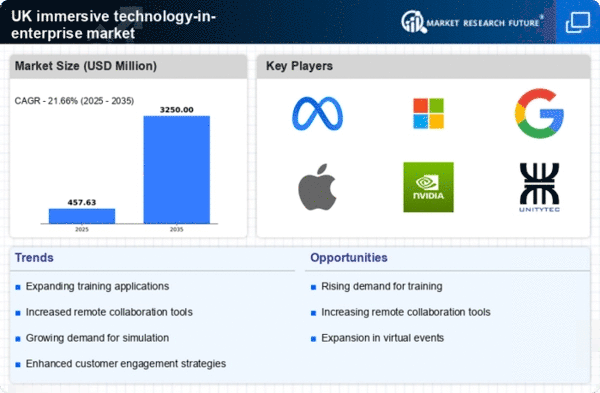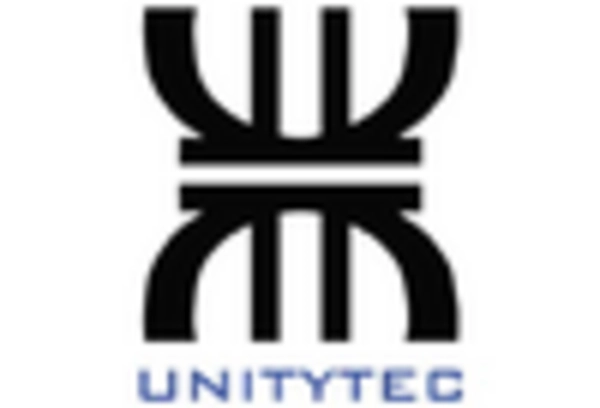Growing Demand for Remote Work Solutions
The immersive technology-in-enterprise market is experiencing a notable surge in demand for remote work solutions. As businesses increasingly adopt flexible work arrangements, immersive technologies such as virtual reality (VR) and augmented reality (AR) are being leveraged to facilitate remote collaboration and training. According to recent data, the UK market for VR and AR in enterprise applications is projected to reach £1.5 billion by 2026, reflecting a compound annual growth rate (CAGR) of approximately 30%. This growth is driven by the need for effective communication tools that can bridge geographical gaps, enhance team engagement, and improve productivity. Companies are investing in immersive platforms to create virtual meeting spaces and training environments, thereby transforming traditional work practices and fostering a more connected workforce.
Growing Awareness of Mental Health and Wellbeing
The immersive technology-in-enterprise market is increasingly intersecting with the growing awareness of mental health and wellbeing in the workplace. Companies are beginning to utilise immersive technologies to create environments that promote mental wellness and reduce stress. For instance, VR applications are being developed to provide mindfulness training and relaxation experiences for employees. This focus on mental health is not only beneficial for employee wellbeing but also enhances overall productivity and job satisfaction. Recent surveys indicate that organisations investing in employee wellbeing initiatives see a 25% increase in employee engagement. As awareness of mental health continues to rise, the immersive technology-in-enterprise market is likely to expand, with more companies adopting these technologies to foster a healthier work environment.
Advancements in Hardware and Software Technologies
The immersive technology-in-enterprise market is being propelled by rapid advancements in hardware and software technologies. Innovations in VR headsets, AR glasses, and software platforms are making immersive experiences more accessible and user-friendly. For instance, the introduction of lightweight, high-resolution headsets has significantly improved user comfort and engagement. Furthermore, software developments are enabling seamless integration of immersive technologies with existing enterprise systems. This evolution is expected to enhance the overall user experience and drive adoption rates. As a result, the immersive technology-in-enterprise market is anticipated to witness substantial growth, with projections suggesting a market size of £2 billion by 2027, as businesses increasingly recognise the value of these technologies in enhancing operational efficiency.
Increased Focus on Employee Training and Development
In the immersive technology-in-enterprise market, there is a heightened emphasis on employee training and development. Businesses are recognising the potential of immersive technologies to deliver engaging and effective training experiences. By utilising VR and AR, companies can simulate real-world scenarios, allowing employees to practice skills in a safe environment. This approach not only enhances learning retention but also reduces training costs. Recent statistics indicate that organisations using immersive training solutions report a 40% improvement in employee performance. As the competition for skilled talent intensifies, companies are likely to invest more in immersive training solutions to attract and retain top talent, thereby driving growth in the immersive technology-in-enterprise market.
Rising Investment in Digital Transformation Initiatives
The immersive technology-in-enterprise market is benefiting from the rising investment in digital transformation initiatives across various sectors. Companies are increasingly recognising the need to modernise their operations and enhance customer experiences through digital solutions. Immersive technologies play a crucial role in this transformation by providing innovative ways to engage customers and streamline processes. For example, retail businesses are utilising AR to create interactive shopping experiences, while manufacturing firms are employing VR for design and prototyping. According to industry reports, UK businesses are expected to allocate over £10 billion towards digital transformation by 2025, with a significant portion directed towards immersive technology solutions. This trend indicates a strong commitment to leveraging immersive technologies as a means to drive competitive advantage.

















